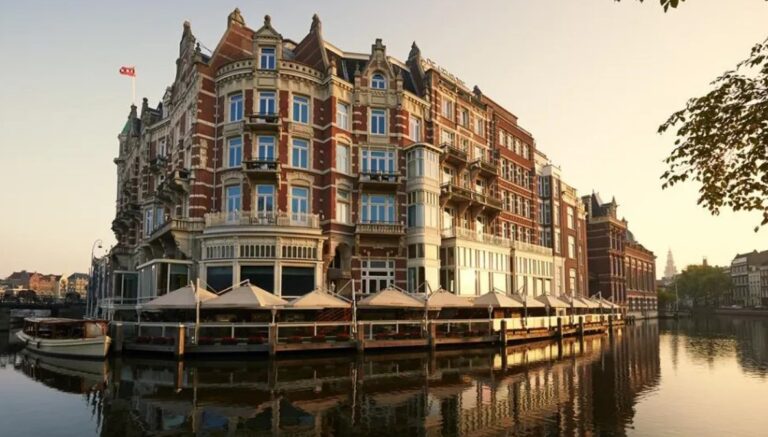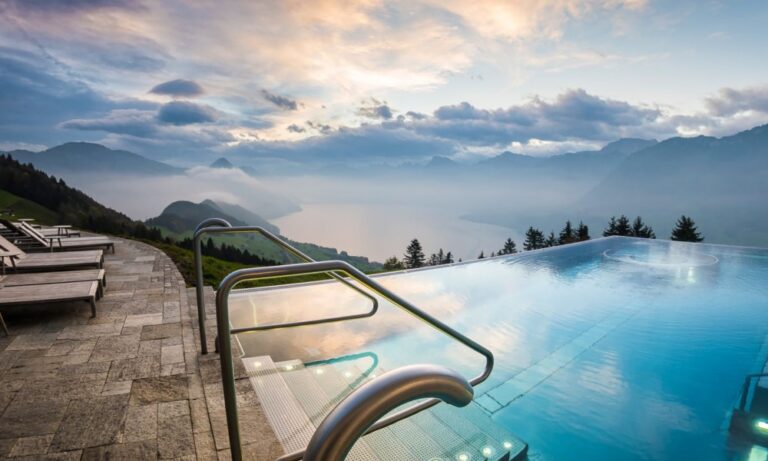Luxury Hotels That Cater To Foodies And Gourmet Travelers
Luxury Hotels That Cater to Foodies and Gourmet Travelers offer an exquisite blend of comfort and culinary delight, inviting guests to indulge in a world where every meal is a masterpiece. These hotels aren’t just places to stay; they are destinations where food lovers can explore unique dining experiences crafted by skilled chefs and inspired by local ingredients.
In this captivating realm, gourmet dining is not merely an option but a central theme, making it essential for luxury hotels to create exceptional culinary experiences that attract discerning travelers. From signature dishes to exclusive chef collaborations, each aspect is designed to tantalize the taste buds and elevate the overall guest experience.
Overview of Luxury Hotels for Foodies
Luxury hotels that cater to food enthusiasts combine exquisite accommodations with unparalleled culinary experiences. These establishments are not just places to stay; they are destinations where flavor and hospitality intertwine. Every detail is crafted to elevate the dining experience, appealing to those who appreciate gourmet cuisine and exceptional service. From Michelin-starred restaurants to immersive cooking classes, these hotels provide a feast for the senses.Culinary experiences are a cornerstone of luxury hotels, as they understand that food can be as memorable as the view from a penthouse suite.
Gourmet dining enhances the overall experience, encouraging guests to indulge in flavors that reflect the local culture and the chef’s artistry. When traveling, many seek not only comfort and luxury but also the opportunity to explore new tastes, making gourmet dining a crucial aspect of their stay.
Key Features That Attract Food Enthusiasts
Luxury hotels targeting foodies often incorporate a variety of features that set them apart. These elements work together to create a distinctive culinary experience that attracts gourmet travelers. Below are some of the key features that are particularly appealing:
- Michelin-Starred Restaurants: Many luxury hotels boast on-site dining options helmed by award-winning chefs. These restaurants often feature innovative tasting menus that showcase seasonal and local ingredients.
- Farm-to-Table Dining: A commitment to sustainability and freshness is evident through farm-to-table concepts where ingredients are sourced from local farms, providing guests with authentic regional flavors.
- Culinary Classes: Interactive cooking classes allow guests to engage with the culinary arts, learning recipes and techniques from skilled chefs while enjoying the fruits of their labor.
- Wine and Food Pairing Events: Exclusive wine tastings and curated pairing dinners enhance the dining experience, offering guests the chance to explore luxury wines alongside gourmet dishes.
- Personalized Dining Experiences: From private chef services to tailored dining itineraries, luxury hotels often go the extra mile to accommodate individual tastes and preferences.
“In the world of luxury travel, the experience of taste can leave an indelible mark on the heart and soul of a traveler.”
The fusion of taste, ambiance, and service in these luxury hotels creates a unique allure for food lovers, turning every meal into a cherished memory.
Top Luxury Hotel Destinations for Food Lovers
For the discerning traveler, luxury hotels are more than just a place to rest; they are gateways to exquisite culinary experiences. Cities around the world have become renowned for their ability to blend opulence with gourmet delights, making them the perfect destinations for food lovers. From Michelin-starred restaurants to local delicacies prepared by renowned chefs, these destinations offer a culinary journey like no other.Among the top cities for food-loving travelers are Paris, Tokyo, New York, and Barcelona.
Each city boasts a unique flavor and style, providing diverse dining experiences ranging from traditional cuisine to avant-garde gastronomic adventures. Below are some highlighted hotels that exemplify luxury while also tantalizing the taste buds.
Luxury Hotels and Their Culinary Offerings
In the world of luxury, the combination of exquisite accommodations and gourmet dining can define the travel experience. Here are some exceptional hotels known for their culinary prowess:
- Paris, France – Le Meurice
This iconic hotel offers a unique dining experience through its restaurant, overseen by celebrated chef Alain Ducasse. Guests enjoy classic French cuisine in a stunning setting inspired by the Hall of Mirrors at the Palace of Versailles. The hotel also features a lavish breakfast spread, including artisanal pastries and local cheese selections. - Tokyo, Japan – The Ritz-Carlton Tokyo
Located in the heart of the city, this hotel features multiple dining options, including the Michelin-starred restaurant, Azure 45, which showcases innovative Japanese cuisine with a French twist. The hotel’s rooftop bar offers breathtaking views of Tokyo Tower, making it an ideal spot for a nightcap alongside exquisite sushi selections. - New York City, USA – The NoMad Hotel
The NoMad’s dining experience is anchored by its renowned restaurant, which emphasizes seasonal ingredients and creative dishes. The lush, European-style café atmosphere complements the menu, which features a range of options from fresh oysters to homemade pasta, crafted by award-winning chefs. - Barcelona, Spain – Hotel Arts Barcelona
This luxury hotel is home to the two-Michelin-star restaurant, Enoteca, led by chef Paco Pérez. Guests can savor Mediterranean-inspired dishes, with a focus on fresh seafood and traditional Catalan flavors. The hotel also offers cooking classes, allowing foodies to dive deeper into the local culinary culture.
The culinary offerings in these destinations highlight the diversity and creativity found in luxury dining. From the rich traditions of French cuisine to the fresh and vibrant tastes of Japanese cooking, each city presents a unique palate. The luxurious settings and exceptional service of these hotels further elevate the dining experience, making them a haven for food enthusiasts.
“In the world of luxury, dining is not just a necessity; it is an art form.”
Signature Dining Experiences in Luxury Hotels

Source: lifestyleasia-onemega.com
Luxury hotels have redefined the art of dining, transforming meals into unforgettable experiences. These establishments often feature unique culinary offerings that allow guests to indulge in both exquisite food and exceptional ambiance. The emphasis on personalized service, artistry in presentation, and the use of high-quality, local ingredients ensure that dining in such settings becomes a memorable adventure for food enthusiasts.Signature dining experiences within luxury hotels often include options such as exclusive chef’s tables, meticulously crafted tasting menus, and themed culinary events.
These experiences not only showcase the talent of celebrated chefs but also reflect the rich culinary heritage of the hotel’s location. Guests can enjoy a feast that highlights local produce, traditional cooking methods, and innovative techniques that push the boundaries of gastronomy.
Unique Dining Experiences in Luxury Hotels
Luxury hotels frequently provide distinctive dining experiences that elevate the act of eating into a form of entertainment. One of the most sought-after experiences is the chef’s table, where guests have the opportunity to dine in close proximity to the kitchen. This setting allows for an intimate atmosphere, where chefs often explain the inspiration behind each dish, adding a personal touch to the meal.
Many hotels also offer tasting menus that comprise a series of small, carefully curated dishes, allowing guests to savor a range of flavors and textures. These menus often change with the seasons, reflecting the availability of fresh, local ingredients.
| Hotel Name | Signature Dish | Location |
|---|---|---|
| The French Laundry | Oysters and Pearls | Napa Valley, USA |
| Le Bernardin | Poached Lobster | New York City, USA |
| Alain Ducasse at The Dorchester | Roasted Pigeon | London, UK |
| Quintonil | Green Mole and Lamb | Mexico City, Mexico |
| Hélène Darroze at The Connaught | Truffled Chicken | London, UK |
The influence of local cuisine on a hotel’s dining offerings is profound. Many luxury hotels prioritize sourcing ingredients from nearby farms and markets, allowing chefs to craft menus that celebrate regional flavors and culinary traditions. This approach not only promotes sustainability but also enriches the dining experience by connecting guests with the culture of the destination. In addition to using local produce, hotels may collaborate with local artisans and purveyors, ensuring that every dish tells a story and reflects the area’s culinary landscape.
As a result, dining at these luxurious establishments becomes a journey through the local culture, making every meal an integral part of the travel experience.
Collaborations with Renowned Chefs
Luxury hotels are increasingly turning to renowned chefs to elevate their culinary offerings, creating unique dining experiences that attract food enthusiasts from around the world. These partnerships not only enhance the hotel’s appeal but also allow guests to indulge in exceptional cuisine crafted by culinary masters. By collaborating with famous chefs, luxury hotels can offer exclusive menus that reflect innovative techniques and diverse flavors, ensuring that every meal is memorable.One of the most significant aspects of these collaborations is the exclusive restaurants established within the hotel premises, often serving as signature dining experiences that distinguish the hotel from others.
These restaurants become destinations in their own right, drawing guests who are eager to savor the chef’s creations. Renowned chefs bring their individual styles and philosophies to the hotel, resulting in culinary artistry that reflects their distinct culinary journeys.
Examples of Hotels with Celebrity Chef Restaurants
Several luxury hotels have made headlines by partnering with celebrity chefs, creating dining venues that have become synonymous with high-quality gastronomy. The following hotels exemplify this trend:
- The Dorchester, London: Home to Alain Ducasse’s restaurant, this iconic hotel offers guests a taste of French haute cuisine in an elegant setting. Ducasse’s focus on seasonal ingredients ensures a menu that is both innovative and reflective of culinary excellence.
- Beverly Hills Hotel, Los Angeles: Known as the “Pink Palace,” this prestigious hotel features the Polo Lounge, which has seen collaborations with various renowned chefs, including Wolfgang Puck, who has created dishes that blend California flavors with international influences.
- The Ritz-Carlton, Tokyo: This luxurious hotel hosts a restaurant by acclaimed chef Jean-Georges Vongerichten, where guests can enjoy a fusion of Japanese and French cuisines, demonstrating the chef’s commitment to fresh, local ingredients with a global twist.
- Four Seasons Resort Maui at Wailea: The resort boasts a restaurant by chef Wolfgang Puck, where the Hawaiian culture and fresh island produce inspire the innovative menu, enhancing the dining experience with a touch of local flair.
The impact of these collaborations on a hotel’s reputation is profound. When a hotel partners with a celebrity chef, it not only elevates its image but also attracts a clientele that is passionate about fine dining. Guests often seek out these dining experiences as a highlight of their stay, contributing to increased customer satisfaction and loyalty. Additionally, the prestige associated with celebrated chefs can lead to higher media exposure, further enhancing the hotel’s allure as a premier destination for food lovers.
“Dining at a restaurant helmed by a renowned chef is not just a meal; it’s an experience that guests will remember long after their visit.”
In summary, the collaboration between luxury hotels and celebrity chefs creates an enriching experience for guests, transforming ordinary dining into extraordinary culinary adventures. These partnerships showcase culinary artistry that enhances the overall appeal of the hotel, making it a haven for gourmet travelers seeking unforgettable gastronomic journeys.
Culinary Events and Experiences Offered by Hotels
Luxury hotels are not just about opulent accommodations and stunning views; they are also hubs for gastronomic adventures that delight food lovers. These establishments curate unique culinary events and experiences that elevate the guest experience and cater specifically to those who appreciate fine dining and gourmet exploration. From wine tastings to interactive cooking classes, these events create memorable moments that connect guests with the local culture and culinary landscape.Culinary events play a crucial role in enhancing the overall guest experience, attracting gourmet travelers who seek more than just a place to stay.
By offering these unique experiences, hotels not only showcase their culinary prowess but also foster a sense of community among guests. Participating in these activities allows visitors to immerse themselves in the local food scene and gain a deeper appreciation for the region’s flavors and traditions.
Notable Culinary Events at Luxury Hotels
Luxury hotels host a variety of culinary events designed to engage guests and provide unforgettable experiences. These events often highlight the skills of talented chefs and local ingredients, creating a rich tapestry of flavors and experiences. Here are some prominent examples:
- Wine Tastings: Many luxury hotels offer exclusive wine tasting events, showcasing local vineyards and international selections. Guests can learn about wine pairing and the intricacies of wine production from knowledgeable sommeliers.
- Cooking Classes: Hands-on cooking classes led by expert chefs allow guests to learn the secrets behind gourmet dishes. Participants can create their culinary masterpieces while enjoying the process of cooking with fresh, local ingredients.
- Food Festivals: Some hotels host annual food festivals, bringing together local chefs and artisans to celebrate the region’s culinary heritage. These festivals often feature tasting menus, cooking demonstrations, and live entertainment.
- Gourmet Dinners: Exclusive dining events featuring multi-course meals prepared by renowned chefs provide a unique gastronomic experience. Often, these events will pair each course with specially selected wines or craft cocktails.
- Culinary Retreats: Certain hotels organize immersive retreats focusing on various culinary themes, such as farm-to-table cooking, pastry making, or regional cuisine. These retreats provide an in-depth experience for serious food enthusiasts.
Guests can easily participate in these culinary experiences during their stay by checking the hotel’s event calendar upon arrival. Reservations for events may be required, especially for exclusive tastings and cooking classes. Some hotels even offer packages that include access to these culinary events, ensuring guests do not miss out on the opportunity to indulge in a gourmet journey. Through these thoughtfully crafted culinary experiences, luxury hotels successfully transform a simple stay into a delightful and enriching adventure for food lovers.
Reviews and Recommendations from Food Critics
The culinary landscape within luxury hotels has garnered significant attention from food critics around the world. Their reviews not only reflect the quality and creativity of the dishes served but also influence travelers’ choices when it comes to dining experiences. As stewards of culinary excellence, food critics have the power to shape perceptions of hotel restaurants, making their insights invaluable for both travelers and hotel management.Food critics play a crucial role in establishing the standards of dining within luxury hotels.
Their reviews often highlight unique culinary offerings, innovative techniques, and the overall dining experience, affecting both the reputation of the hotel and the expectations of the guests. In this competitive sector, critics’ opinions can serve as a guiding light for food lovers seeking unforgettable gastronomic adventures.
Notable Food Critic Reviews
Numerous luxury hotels have received accolades and noteworthy reviews from food critics, elevating their status in the culinary world. The following list showcases some renowned hotels that have been praised for their dining experiences:
- The French Laundry, Yountville, California: Hailed by critics as a mecca for food lovers, this restaurant within the luxury hotel offers a seasonal tasting menu that emphasizes local ingredients. Renowned food critic Anthony Bourdain described it as “a culinary dreamland.”
- Le Bernardin, New York City: This luxury hotel dining establishment receives consistent praise for its refined seafood dishes. Renowned critic Ruth Reichl noted its “perfection on a plate,” appealing to gourmets seeking a sophisticated dining experience.
- Joël Robuchon, Las Vegas: Recognized for its exceptional French cuisine, this hotel restaurant has earned multiple Michelin stars. Food critics commend its artistry and attention to detail, with one stating, “Each dish tells a story, masterfully crafted.”
- Restaurant at Meadowood, St. Helena, California: Celebrated for its farm-to-table approach, this dining venue has received accolades for its innovative menu. Critics have remarked on its ability to create a “seamless connection between food and the landscape.”
Food critics not only highlight the standout features of hotel dining but also encourage hotels to continually innovate. Their recommendations can lead to increased reservations, as travelers often seek venues that have been vetted by respected voices in the culinary community. The impact of a positive review can be transformative, elevating a hotel from obscurity to a must-visit destination for gourmet travelers.
“A review can open doors or close them, shaping the future of dining experiences within luxury hotels.”
The criteria used by food critics to evaluate luxury hotel dining often include factors such as taste, presentation, ambiance, and service quality. This comprehensive approach helps to create a well-rounded understanding of a hotel’s culinary offerings, ensuring that guests receive an experience that exceeds their expectations. By comparing various luxury hotels based on these criteria, food lovers can confidently select the perfect destination to indulge in exquisite cuisine crafted by talented chefs.
Sustainable and Local Sourcing in Hotel Dining

Source: nishathotels.com
In the realm of luxury hotel dining, sustainability has become a cornerstone of culinary excellence. As travelers increasingly seek out experiences that resonate with their values, hotels are rising to the occasion by prioritizing sustainable practices and local sourcing. This commitment not only enhances the dining experience but also fosters a deeper connection between guests and the communities they visit.The importance of sustainability in luxury hotel dining cannot be overstated.
By focusing on local and organic ingredients, hotels not only support regional farmers and producers but also reduce their carbon footprint. Many hotels have established partnerships with nearby farms, fisheries, and artisan producers, ensuring that their menus reflect the flavors and traditions of the locale. This practice enriches the guests’ experience while promoting a responsible and ethical approach to dining.
Benefits of Sustainable and Local Sourcing
Incorporating sustainable and locally-sourced ingredients into hotel dining offers numerous advantages for both guests and the environment. Understanding these benefits helps to appreciate the broader impact of these culinary choices.
- Freshness and Quality: Local ingredients are often harvested at their peak, resulting in fresher and more flavorful dishes that elevate the dining experience.
- Supporting Local Economies: By sourcing from local producers, hotels contribute to the economic health of their communities, fostering growth and sustainability.
- Environmental Conservation: Sustainable practices reduce the carbon footprint associated with transportation and mass production, leading to a healthier planet.
- Cultural Connection: Menus that feature local cuisine and ingredients offer guests a taste of the region’s culture and heritage, enriching their travel experience.
- Health Benefits: Organic ingredients often come without harmful chemicals and pesticides, contributing to a healthier dining option for guests.
- Educational Opportunities: Many hotels provide opportunities for guests to learn about local agriculture and sustainability practices, enhancing their overall experience.
- Positive Brand Image: Hotels that prioritize sustainability enhance their reputation, attracting discerning travelers who value eco-conscious practices.
“Dining should not only satisfy hunger but also nurture our planet and communities.”
Future Trends in Luxury Hotel Dining

Source: medium.com
The culinary landscape within luxury hotels is constantly evolving, shaped by new preferences and innovative ideas that cater to discerning travelers. As chefs and hospitality experts look to the future, several trends are emerging that promise to enhance the dining experience for food enthusiasts. These shifts reflect both changing consumer demands and a commitment to sustainability and creativity in the culinary arts.The future of luxury hotel dining is marked by an increasing focus on personalization and unique experiences.
Guests are seeking more than just a meal; they desire an immersive journey that engages their senses and reflects local cultures. This trend is driving hotels to rethink their dining spaces, menus, and overall guest interactions. Here are some key trends to watch for:
Innovative Dining Concepts
As luxury hotels strive to elevate their culinary offerings, several innovative dining concepts are gaining traction, transforming how guests experience food within these establishments. These concepts not only enhance the dining experience but also create memorable moments that guests will cherish long after their stay.
- Farm-to-Table Initiatives: Luxury hotels are increasingly partnering with local farmers to provide fresh, seasonal ingredients directly to their kitchens. This not only supports local economies but also ensures the highest quality for guests.
- Themed Culinary Experiences: Creating thematic dining nights around specific cuisines or historical culinary traditions allows hotels to craft unique experiences that resonate with guests’ interests.
- Interactive and Experiential Dining: Incorporating elements such as cooking classes, chef’s table experiences, and multi-sensory meals engages guests in a dynamic way, making them a part of the culinary process.
- Technology Integration: Use of augmented reality (AR) and virtual reality (VR) to enhance the dining experience, offering guests unique storytelling elements alongside their meals.
- Focus on Plant-Based Cuisine: With the rise of health consciousness and environmental awareness, luxury hotels are expanding their plant-based menus, offering gourmet vegan and vegetarian options that appeal to a broader audience.
“Creating unique dining experiences is not just about food; it’s about crafting memories that last a lifetime.”
As these concepts take root, they influence guest preferences and expectations, leading to a culinary revolution that enriches the luxury hotel experience. By embracing these trends, hotels can create not only exceptional meals but also unforgettable moments that resonate deeply with food-loving travelers.
Concluding Remarks
In conclusion, the journey through luxury hotels catering to foodies reveals a vibrant landscape where culinary artistry and hospitality intersect. These hotels not only provide lavish accommodations but also transform dining into an unforgettable experience, inviting guests to explore flavors that resonate with local culture and global trends.
As gourmet travelers seek more than just a place to rest, they find that luxury hotels dedicated to exceptional dining create lasting memories that linger well beyond their stay.
Top FAQs
What are some examples of luxury hotels for foodies?
Examples include The Ritz-Carlton in Paris, The Four Seasons in Florence, and The St. Regis in New York, all known for their exceptional dining options.
How can guests participate in culinary events at these hotels?
Guests can often sign up for events like wine tastings or cooking classes through the hotel’s concierge or on their official websites.
Do luxury hotels offer special dietary accommodations?
Yes, most luxury hotels are equipped to handle various dietary restrictions and will work with guests to provide suitable options.
Are there any culinary experiences exclusive to certain destinations?
Yes, many destinations offer unique culinary experiences that reflect local cuisine, such as sushi-making classes in Japan or pasta-making in Italy.
What role do local ingredients play in luxury hotel dining?
Local ingredients enhance the authenticity of dishes, support sustainability, and often create a more vibrant flavor profile in the hotel’s culinary offerings.





